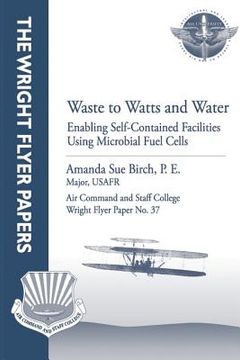Waste to Watts and Water: Enabling Self-Contained Facilities Using Microbial Fuel Cells: Wright Flyer Paper No. 37 (en Inglés)
Reseña del libro "Waste to Watts and Water: Enabling Self-Contained Facilities Using Microbial Fuel Cells: Wright Flyer Paper No. 37 (en Inglés)"
Lack of investment in future agile combat-support technologies could lead to a strategic surprise that diverts military attention and resources from critical air, space, and cyber operations. Looking to the national security environment in 2030, this research explores one technology-the microbial fuel cell (MFC)-that gives life to self-contained facilities decoupled from vulnerable supply lines and infrastructure networks. MFCs can dispose of waste (sewage, food scraps, gray water, etc.) while producing clean water (up to 70 percent of required volumes) and power (up to 600 watts per person). Using relevance tree methodology, the research concludes that USAF research and development investment alone will not bring MFCs to fruition. A successful strategy for MFCs will be collaborative, addressing not only the technological barriers but also the key social, industrial, and political hurdles to enabling this capability. Fully developed, this technology could save up to $50 million a day for a 150,000-person deployment. Beyond cost and mobility advantages, MFCs could enable homeland security against the terrorist threat and provide power, water, and sanitary waste disposal after wars or natural disasters. They could also bolster the legitimacy of stressed governments, offer security against chronic water and energy shortages, and function in isolated areas as well as urban centers. In addition to military uses, MFCs could become a diplomatic and economic tool to pursue a better state of peace by building a foundation for democratic and economic development.

